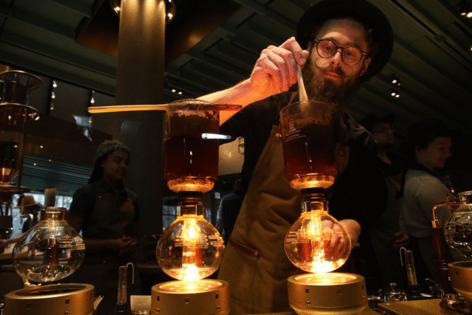Starbucks gives baristas smaller pay raises after tough year
Published in Business News
Raises for many Starbucks Corp. baristas will shrink in light of the company’s worst financial results since the pandemic.
Pay increases will generally range from 2% to 3% depending on seniority, with some exceptions, according to a document seen by Bloomberg News. A year ago, the company announced retail workers would be getting raises of at least 3%, with those having five years or more of tenure receiving at least 5%.
This year, hourly employees with five years of service will get a 3% increase or a bump that brings their wages to at least 10% above their market’s starting rate, whichever is higher. Workers with two-year tenures will get the highest of a 2.5% raise or a hike that lifts their wage to at least 5% above their area’s starting rate.
Workers who started more recently will get either 2% or a bump to the local market’s starting rate, depending on how long they’ve been employed.
The smaller pay increases follow a year of turmoil in which boycotts, price increases and slow service sparked lower traffic and falling sales. In response, Starbucks replaced its chief executive officer with former Chipotle Mexican Grill Inc. boss Brian Niccol, offering him a pay package worth more than $100 million, part of which is tied to the company’s future performance. He has pledged to improve the worker experience as part of his plan to revive revenue. His strategy includes streamlining the menu and reviewing staffing levels, among other changes.
Starbucks stock fell 0.6% in New York trading on Thursday. The shares have gained 1.9% this year, compared to a 27% advance for the S&P 500 Index.
Barista raises, which aren’t tied to performance, will go into effect on Dec. 30, with workers seeing the changes in their checks on Jan. 10 or Jan. 17 depending on their pay cycle, according to the document. Starbucks said it would continue to pay above local minimum wage in all U.S. markets. The pay increases are dependent on considerations such as market competitiveness and business results.
“In a year when Starbucks was willing to invest tremendous resources in securing top executive talent, the company needs to do more to invest in partners all the way through the system,” said Michelle Eisen, a barista and leader with Starbucks Workers United, the union representing about 5% of the company’s baristas.
The union, which has said that bargaining with the company is moving to its final stages, is pushing for a contract framework that addresses a variety of concerns, including scheduling and staffing.
Managers were instructed to tell workers that Starbucks offers competitive pay while also reminding them that it’s just “one component” of a compensation package that also includes paid sick and vacation time, a Spotify premium account, and 20 free mental health sessions. Workers can also get health insurance and college tuition.
Starbucks gives workers equity in the company through a program known as Bean Stock. About 230,000 workers received the grants this year, the company said. Wages for hourly retail workers average more than $18, a Starbucks spokesperson said, ranging from $15.25 to $26. With benefits, the compensation package is valued at $30 an hour on average, according to the company.
Starbucks has also said it has given workers more hours, allowing them to make more money while becoming eligible to get or maintain benefits. Earlier this year, Starbucks said turnover for hourly workers had reached post-pandemic lows.
Baristas aren’t the only ones being affected by the company’s underperformance. Many corporate workers are only getting 60% of their overall bonuses, Bloomberg News reported in November.
©2024 Bloomberg L.P. Visit bloomberg.com. Distributed by Tribune Content Agency, LLC.












Comments